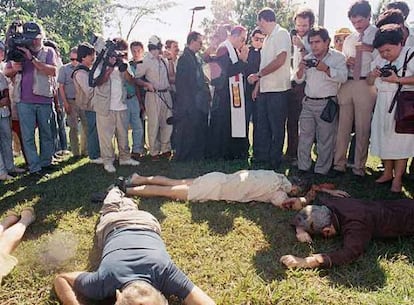Spain calls for arrest of 18 soldiers accused of killing priests in El Salvador
International warrant over killing of Spanish clergy members in 1989 re-issued

Spain has re-issued an international arrest warrant for 18 Salvadoran ex-military officers accused of orchestrating and carrying out the 1989 murders of six Jesuit priests, five of whom were Spanish citizens. Almudena Bernabeu, international attorney and Transitional Justice Program director for the Center For Justice and Accountability has confirmed to EL PAÍS that the San Francisco-based organization is responsible for filing the criminal complaint, in which Bernabeu is named as the plaintiff.
“This re-issuance of the arrest warrant for the suspected material and intellectual authors of the assassination of the six Jesuits priests and two women who worked with them is due to new jurisprudence in El Salvador, which not only allows for locating but also arresting the suspects and extraditing them to Spain,” Bernabeu says. The international attorney is well-known for filing legal complaints in the United States against Latin American suspects.
The 18 Salvadoran ex-military officers are accused of terrorist acts and crimes against humanity
In May 2011, Spanish High Court Judge Eloy Velasco, who is presiding over the case in Madrid, issued the first arrest warrant for the 18 soldiers. But the Salvadoran Supreme Court of Justice said the case had already been argued and a 1993 amnesty law protected the officers. The previous government also provided safe shelter in military barracks for the accused.
Five of the six Jesuit priests killed were Spanish citizens, including Ignacio Ellacuría and Ignacio Martín-Baró, both lecturers at the Central American University (UCA) and well-known proponents of liberation theology. Spanish priests Segundo Montes, Armando López and Juan Ramón Moreno, the Salvadoran clergyman Joaquín López, their housekeeper Julia Elba Ramos, and her 16-year-old daughter, Celina Mariceth Ramos, both Salvadoran citizens, were also killed in the attack.
Bernabeu, who spoke to this newspaper from Spain, says Judge Velasco asked authorities to re-issue the international arrest warrants against the 18 soldiers who are accused of crimes against humanity and terrorist acts. The massacre, the largest attack against the Society of Jesus, is considered one of the worst violations of human rights committed in El Salvador, where San Salvador Archbishop Oscar Arnulfo Romero was also killed nine years earlier. Romero was canonized in May 2015.
“Now Salvadoran authorities will decide if they arrest the soldiers and hold them in custody,” Bernabeu says, adding that Judge Velasco “is doing very serious work and last week he admitted a document in which the plaintiffs re-submitted their request for the capture of the former Salvadoran officers,” which implies re-issuing international warrants for the suspected authors of the massacre.
The new warrants call for the arrests of Juan Orlando Zepeda, Rafael Humberto Larios, Juan Rafael Bustillo, Francisco Elena Fuentes, José Ricardo Espinoza Guerra, Gonzalo Guevara Cerritos, Óscar Mariano Amaya Grimaldi, Antonio Ramiro Ávalos, Ángel Pérez Vásquez, Tomás Zárpate Castillo, José Alberto Sierra Ascensio, Guillermo Alfredo Benavides, Joaquín Arnoldo Cerna, Carlos Mauricio Guzmán Aguilar, Héctor Ulises Cuenca Ocampo and Óscar Alberto León.
This time René Emilio Ponce and Inocente Montano are not on the list. Ponce died in 2011 and Montano is currently being held in a Boston prison where he awaits extradition to Spain.
Between 1980 and 1992, 75,000 people were killed in the Salvadoran Civil War and there were 8,000 forced disappearances.
English version by Dyane Jean Francois.
Tu suscripción se está usando en otro dispositivo
¿Quieres añadir otro usuario a tu suscripción?
Si continúas leyendo en este dispositivo, no se podrá leer en el otro.
FlechaTu suscripción se está usando en otro dispositivo y solo puedes acceder a EL PAÍS desde un dispositivo a la vez.
Si quieres compartir tu cuenta, cambia tu suscripción a la modalidad Premium, así podrás añadir otro usuario. Cada uno accederá con su propia cuenta de email, lo que os permitirá personalizar vuestra experiencia en EL PAÍS.
¿Tienes una suscripción de empresa? Accede aquí para contratar más cuentas.
En el caso de no saber quién está usando tu cuenta, te recomendamos cambiar tu contraseña aquí.
Si decides continuar compartiendo tu cuenta, este mensaje se mostrará en tu dispositivo y en el de la otra persona que está usando tu cuenta de forma indefinida, afectando a tu experiencia de lectura. Puedes consultar aquí los términos y condiciones de la suscripción digital.








































